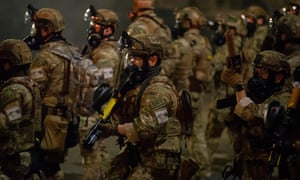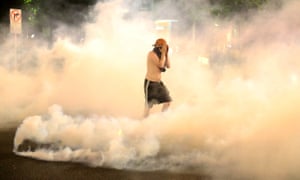Portland protests: federal agents' actions draw city into a national debate
Civil rights leaders in Oregon say the Trump administration’s involvement have upped the stakes on what was a localized conflict
 Federal agents walk toward a crowd of protesters in Portland, Oregon. Photograph: Nathan Howard/ZUMA Wire/REX/Shutterstock
Federal agents walk toward a crowd of protesters in Portland, Oregon. Photograph: Nathan Howard/ZUMA Wire/REX/Shutterstock
Federal agents in Portland, Oregon have detained protesters in unmarked vans, teargassed crowds, beaten reporters and worked without visible identification or insignia in recent days, as Black Lives Matter protests in the city near the end of their eighth consecutive week.
The agents have acted despite the objections of Portland mayor Ted Wheeler, Oregon’s governor Kate Brown and Oregon’s two Democratic senators.
They have met resistance in the streets from protestors but also now in the courts and from politicians, as Oregonians discern national implications in Donald Trump’s insertion of federal forces into policing in Portland.
Portland has now become the focus for both sides in the conflict. The US president and his supporters in conservative media, see the intervention as a template to be used in cities around the country. Meanwhile, his opponents see the city as a rallying cry, strengthening protests and providing a dramatic act which can be used to warn against Trump’s authoritarian tendencies.
On Wednesday, Trump announced “a surge of federal law enforcement into American communities plagued by violent crime”.
On Tuesday, fifteen US city mayors, including Wheeler, likened Trump’s moves to those of an “authoritarian regime”, and demanded that federal agents not be sent into their cities”.
Locally, civil rights leaders in Oregon say Trump’s actions have upped the stakes on protests, which until now were mostly focused on the Portland Police Bureau (PPB), which has been accused of heavy-handed and biased policing of protests.
Eric K Ward, executive director of the Western States Center (WSC), a Portland-based civil rights organization, said that while Portlanders have “our own struggles that are unique to our community, the Trump administration has now put us in the midst of a national debate that has national consequences”.
He added: “If this goes with no serious political response and consequence, it opens the door for the president to create his own personal security force that he can deploy anywhere in the country, without regard to the constitution.”
The WSC is now a co-plaintiff in a suit brought against four federal agencies: the Department of Homeland Security (DHS), the US Marshalls Service (USMS), Customs and Border Patrol (CBP), and the Federal Protective Service (FPS).
The suit claims that the administration’s actions are unconstitutional, and that it has “encroached upon powers explicitly reserved to the state of Oregon, and to Oregon’s citizens”, and “deprived Portlanders the right to protest peacefully”.
At an online event announcing the suit, Oregon Senator Jeff Merkley condemned Trump’s “secret police tactics”, likening the administration to governments in “Turkey, Russia, and the Philippines”.
Constitutional questions are now at the heart of a series of legal actions brought against local and federal law enforcement by nonprofits and the state of Oregon.
Organizations including the ACLU of Oregon and the Oregon Justice Resource Center (OJRC) initially launched suits against the city of Portland, seeking to restrain PPB’s use of force. The ACLU’s initial suit focused on the protection of journalists and legal observers. Earlier this month, they won an injunction against police dispersals of identified reporters.
PPB tactics against early protests provoked questions from local media and professional bodies about whether journalists were being specifically targeted. OJRC sued in June, on behalf of protest groups, winning injunctions against PPB use of teargas, which had been frequent.
But since federal officers have taken a more active role, the focus of civil rights groups has shifted. Last Friday, the ACLU filed suit, requesting a restraining order, against the DHS and the USMS, again on behalf of journalists and legal observers.
The ACLU alleged that several reporters had been shot, one being hit with “plastic bullets launched with enough force to put bullet holes in his ‘PRESS’ T-shirt”.
Jann Carson, interim executive director of the ACLU of Oregon, said: “The violence and brutality unleashed by police and federal agents is unjustified and unconstitutional. Federal agents are terrorizing people on the streets of Portland and it must stop. Federal agents must leave Portland now.”
Also last Friday, Oregon attorney general Ellen Rosenblum filed suit against USMS and DHS, as well as the FPS, Customs and Border Patrol and unnamed individual officers. It alleged their tactics “violate the rights of all people detained … and violate the state’s sovereign interests”.
Rosenblum’s complaint repeated allegations made by protesters and in press reports, that federal officers had used “unmarked vehicles to drive around downtown Portland … removing them from public without either arresting them or stating the basis for an arrest”.
Local Republicans, however, see no immediate constitutional issues.
Asked if Trump had the authority to send in federal police over local objections, James Buchal, chair of the Multnomah county Republican party, said: “There is a lot of law in this context upholding federal authority to intervene and limiting judicial intervention, though the rule of law seems now in many cases to be placed with ‘Trump derangement syndrome’.”
But most local protest leaders and city officials remain defiant.
On Saturday, Portland city commissioner Jo Ann Hardesty published an open letter to mayor Wheeler in which she described federal agents as an “occupying force” and a “goon squad”. On Monday night, as a crowd swollen by reports of the crackdown gathered at the federal courthouse, she retweeted a video of the large crowd, adding: “That’s my city, standing up against federal and local police brutality.”
Asked whether she considered the Trump administration’s deployment of federal agents in downtown Portland constitutional, Hardesty replied: “Absolutely not. Not only that, but we’re in a pandemic and they’re using war weapons on community members standing up against police brutality.”
Hardesty added that if the Wheeler handed her control of PPB, as she demanded in her letter, “in the first week I would commit to truly disengaging any and all PPB collaboration with the federal officers and initiate any internal investigations that need to happen”.
The mayor’s office did not immediately respond to a request for comment.
Carson, of the ACLU, wrote: “Our local police have escalated violence and federal agents are adding to the escalation. America is worth fighting for, and we are ready to fight for it.”
Ward, of the WSC, said: “Donald Trump picked the worst city in America to target in his attack on constitutional law. I think that he will come to regret that he ever said the name Portland.”
----------------------------------------------------------------------------------
My comments :
1. If and when the National and State polls (as is happening as we speak) do show an increasing likelihood of the racist and fascist Trump losing the upcoming elections, his political puppet players (like Stephen Miller and William Barr) might just decide to provoke a semi-civil war at the time of the Octobre / Novembre elections.
2. Provoking a civil war, in order to prevent the elections from happening at all, (for exemple) by declaring the state of emergency and rule by decree.
2. Provoking a civil war, in order to prevent the elections from happening at all, (for exemple) by declaring the state of emergency and rule by decree.

Geen opmerkingen:
Een reactie posten
Opmerking: Alleen leden van deze blog kunnen een reactie posten.